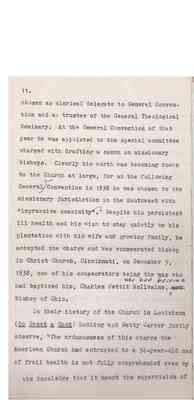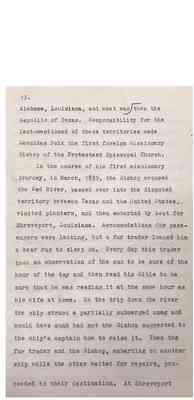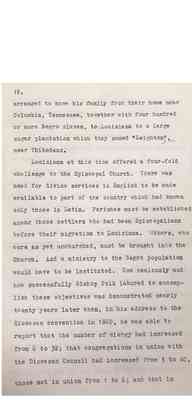Pages That Mention Louisiana
Polk Family Papers Box 1 Document
12
-11-
chosen as clerical delegate to General Convention and as trustee of the General Theological Seminary. At the General Convention of that year he was appointed to the special committee charged with drafting a canon on missionary bishops. Clearly his worth was becoming known to the Church at large, for at the following General Convention in 1838 he was chosen to the missionary jurisdiction in the Southwest with "impressive unanimity". Despite his persistent ill health and his wish to stay quietly on his plantation with his wife and growing family, he accepted the charge and was consecrated bishop in Christ Church, Cincinnati, on December 9, 1838, one of his consecrators being the man who had baptized him, Charles Pettit McIlvaine, who had become Bishop of Ohio.
In their history of the Church in Louisiana (So Great a Good) Hodding and Betty Carter justly observe, "The arduousness of this charge the American Church had entrusted to a 32-year-old man of frail health is not fully comprehended even by the knowledge that it meant the supervision of
14
-13-
Alabama, Louisiana, and what was then the Republic of Texas. Responsibility for the last-mentioned of these territories made Leonidas Polk the first foreign Missionary Bishop of the Protestant Episcopal Church.
In the course of his first missionary journey, in March, 1839, the Bishop crossed the Red River, passed over into the disputed territory between Texas and the United States, visited pplanters, and then embarked by boat for Shreveport, Louisiana. Accommodations for passengers were lacking, but a fur trader loaned him a bear rug to sleep on. Every day this trader took an observation of the sun to be sure of the hour of the day and then read his Bible to be sure that he was reading it at the same hour as his wife at home. On the trip down the river the ship struck a partially submerged snag and should have had not the Bishop suggested to the ship's captain how to raise it. Then the fur trader and the Bishop, embarking on another ship while the other waited for repairs, proceeded to their destination. At Shreveport
15
-14-
Polk was told, "We have never had any preaching here, and we don't want any." But the West Pointer was not intimidated. He persuaded a Shreveporter to lend him a house for services, posting a $600 bond against any damage that might be done by ruffians. His friends, the fur trader, borrowed a table, covered it with a white cloth on which he laid his Bible, and then went through the town, ringing a hand-bell to give notice of the service. At the last moment, when a mob, as well as a congregation, was gathering, the sunken steamer which the Bishop had raised came into port, and the crew, hearing of the disturbance, rushed to the scene of the expected riot, and declared that the Bishop should not be molested. He was no "common preacher," they said; he knew how to work, and they would like to see anyone hinder him from preaching if he wished to do so. Accordingly the service was held in quietness in the little settlement which the Bishop correctly prophesied would become the second largest city in Louisiana.
On another occasion, in the course of his third missionary visitation, Bishop Polk was riding
18
-17-
official acts to General Convention: baptisms, 71; confirmations, 199; ordinations: deacons, 1; priests, 3; marriages, 3; churches consecrated, 5. He made his own comment as follows: "The vast extent of the field, the dispersed condition of the population, and the absence of facilities for communication with the different parts of it, have made the labor very great, and the apparent results far less than I could have desired. I have felt that I was engaged in the work of a pioneer, and that the seeds I was sowing, cast in as I trust in faith, would, under the watering of my successors, and the blessing of God, spring up in due time and bring forth fruits unto eternal life."
While at the General Convention in New York City in October, 1841, Bishop Polk was invited by the deputies from Louisiana to accept the bishopric of their diocese. The request was approved by the House of Bishops; on October 16 the House of Deputies confirmed the election, and Leonidas Polk became Bishop of Louisiana, having resigned his missionary jurisdiction. He promptly
19
-18-
arranged to move his family from their home near Columbia, Tennessee, together with four hundred or more Negro slaves, to Louisiana to a large sugar plantation which they named "Leighton," near Thibodaux.
Louisiana at this time offered a four-fold challenge to the Episcopal Church. There was need for divine services in English to be made available in part of the country which had known only those in Latin. Parishes must be established among those settlers who had been Episcopalians before their migration to Louisiana. Others, who were as yet unchurched, must be brought into the Church. And a ministry to the Negro population would have to be instituted. How zealously and how successfully Bishop Polk labored to accomplish these objectives was demonstrated nearly twenty years later when, in his address to the diocesan convention in 1860, he was able to report that the number of clergy had increased from 6 to 32; that congregations in union with the Diocesan Council had increased from 3 to 40, those not in union from 1 to 6; and that in




